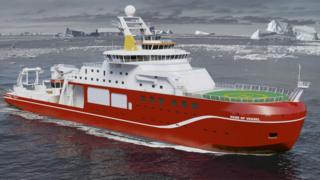Boaty Floats… err, sinks
Well, as I noted last week Boaty McBoatface lost out to David Attenborough…. so Boaty was sunk. But NERC have now floated his boat… or rather they have sunk it! Yes Boaty will be the name of an ROV. Perhaps the most famous ROV in the world!
Pie on Boaty McBoatface
The whole process for naming NERCs new polar research vessel twists and turns through the media. The fact that naming a polar vessel actually made the news is pretty good in and of itself - how much the general public is aware of polar science is somewhat of an unknown, but it was great to see some coverage of the vessel itself. That then hit a whole new level of media frenzy when Boaty McBoatface topped the poll of votes - and what better way to get (unexpected) media attention and so public interest. This then sunk into farce when the House of Commons Science and Technology Committee called NERCs CEO and Head of Communications to give evidence as to whether this was a good process. Committee chair, Nicola Blackwood (MP) commented:
“My committee wants to explore this as an example of science communication. Was it a triumph of public engagement or a PR disaster? We’ll also want to know how Nerc intends to build on the mass coverage they’ve attracted and engage people with the vital polar science that Boaty will be enabling.”
I can’t think of a more pointless exercise - surely there are plenty of examples of science communication that could be pulled together rather than hauling two people up to London. Of course, this was all deflated with the news that the ship will be called the RRS Sir David Attenborough, which is a bit of a let down. I wonder if the committee would review whether the MPs expenses scandal was a triumph of public engagement or a PR disaster. It certainly got people interested in politics again!

Monopoly Map
Vaguely following on with the underground map meme, I thought it would be good fun to locate all the Monopoly squares on a map of a London and visit them. A quick google shows that this is a popular pastime and, indeed, a popular pub crawl (perhaps one of the more energetic ones!). But it’s always more fun to piece together your own, so here’s My (well my son’s) stab at pinning the different locations. Of course you can argue over Water Works, Electric Company, Jail, Chance Community Chest, SUper Tax, Income Tax and Free Parking as much as you like. They aren’t specific locations in my book so I don’t care!! But damn the person who put Old Kent Road on the board - one out of the way journey!
What are the British Isles?
A seemingly simple question but one that causes no end of confusion because it is both geographic and political and using it the wrong context can cause no end of upset!!! Is Northern Ireland in Great Britain? Or the UK? Is Jersey? Where does Ireland fit in?
To bring some clarity the EUler diagram (below) from Wikimedia helps considerably and visit the Terminology of the British Isles page. In short its easiest to refer to the British Isles when thinking geographically of all the islands, whilst the United Kingdom of Great Britain and Northern Ireland (or UK for short) when talking about the commonly designated political entity.

Too good to be forgotten
Too good to be forgotten (from Radio 4 Analysis) talks about “corporate memory loss”, that is the body of knowledge about how a company “does stuff” that is lost when people move companies or move jobs within a company. The brain drain. Now for everyday tasks, or tasks which are heavily prescribed (and often mandated), that is not a problem - have a manual, train people, do the job. But for those “professional” tasks where complex bespoke processing is required, that is usually not possible. And for those tasks that are unusual or “singular”, you learn when it happens the first time. As an individual you can then do it again in the future - but as a corporate?? As the programme notes, for things like recessions, market crashes, cold war…. these collective memories have or are being lost. The programme offers some pointers for how this knowledge might be preserved.
However this is not a new problem and has been around for millennia, although the rise of big business and, in particular, the fast turnover in jobs, makes this more acute. It reminded me of the work of Steve Denning who presented at a TedX event on the knowledge management he introduced at the World Bank called the springboard story. He presents in his book The Springboard. And specifically this was a short, focused, story designed to stimulate energy and enthusiasm, leading to change. This can be used as a leadership strategy or, in the manner originally used at the World Bank, making knowledge available, retaining, storing, managing that information. His strategy for developing the stories follow four steps:
1. True story: factually and authentically
2. Positive: inspire people with a positive story, happy ending
3. Minimalist Telling: not entertainment, stripped down, streamlined, core information
4. Contrasts Before and After: make it clear what the benefit is. This is the “take home”
Sage advice and worth thinking about within the context of your own business or industry.